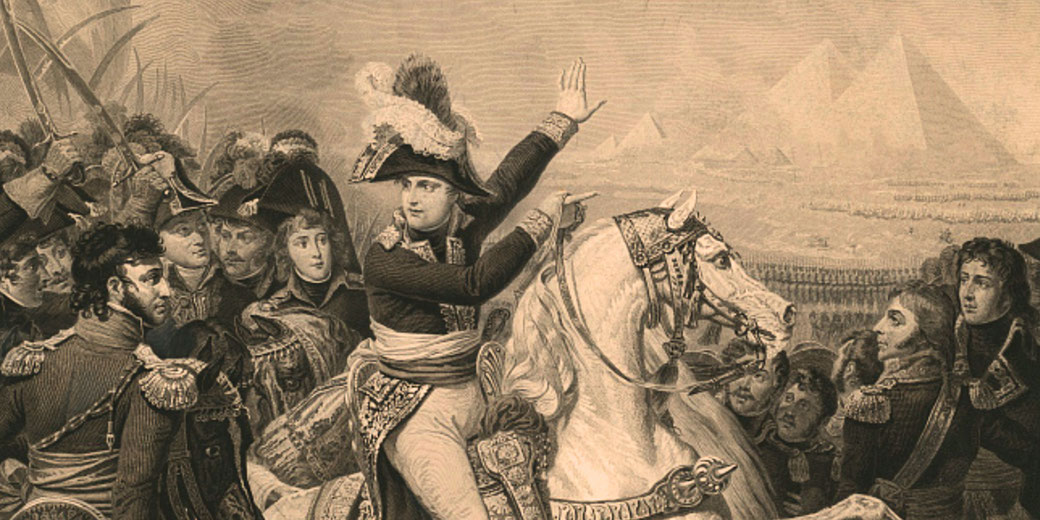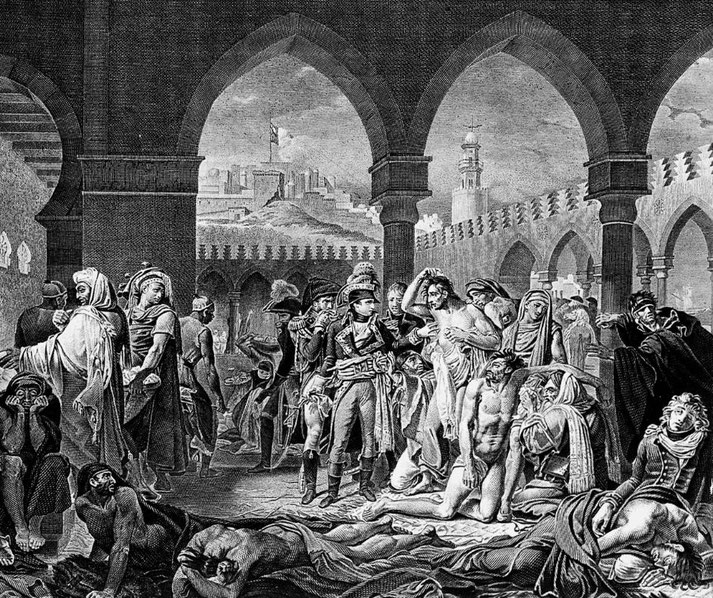Napoleon's catastrophic invasion of Egypt: What went wrong?

As the 18th century was drawing to a close, Napoleon Bonaparte embarked on one of the most audacious military expeditions in all of world history.
He sailed the French revolutionary army across the Mediterranean to invade Egypt. However, despite Napoleon's reputation as a young and ambitious general, this campaign quickly became a humiliating fiasco.
How did it all go so wrong?
And how did Napoleon manage to salvage his own reputation as a military genius and still become the most powerful man in Europe?
Why did France want to invade Egypt?
In the last decade of the 18th century, Europe was embroiled in a series of revolutionary wars with France.
After the French nation had removed its king during the French Revolution, the burgeoning republic had to fight for its very survival against other European monarchs who formed military coalitions to defeat them.
The most persistent and dangerous enemies of France during this time were the Austrians and the British.
At the heart of this conflict was the French general Napoleon Bonaparte.
The young Napoleon had risen to prominence through his military successes during the French Revolutionary Wars.
However, Napoleon harbored even grander aspirations for his young nation and himself.
His eyes were set on Egypt, a region of increasing strategic importance, as it lay at the vital crossroads of Europe, Asia, and Africa.
Seizing control of Egypt would enable France to disrupt British trade routes to India, thereby weakening Britain's economic and colonial strength.
Additionally, Egypt's location made it a crucial steppingstone for further French expansion into the Middle East and possibly even into the Indian subcontinent.
Napoleon envisioned this campaign as a means to establish a French presence in the East, counter British influence, and spread the revolutionary ideals of liberty and equality.
Napoleon's expedition to Egypt
The expedition set sail from Toulon on May 19, 1798, with a fleet of over 300 vessels carrying around 35,000 soldiers, engineers, and scientists.
The journey was a high-risk venture, especially given the strong naval presence the British held in the Mediterranean.
If their ships were found and attacked, it would be a sure defeat for Napoleon.
However, the French forces managed to evade the British Royal Navy and landed in Alexandria on July 1, 1798.
Upon landing in Egypt, the French forces quickly secured the city with minimal resistance from local forces.
Napoleon's strategy was swift and aggressive; he aimed to strike at the heart of Egypt by marching towards Cairo.
The French army encountered the Mamluk forces at the Battle of the Pyramids on July 21, 1798.
Napoleon arranged his troops in divisional squares to repel cavalry charges, resulting in a decisive victory that left thousands of Mamluks dead or wounded.

Once he felt he had sufficient control of the capital, Napoleon introduced a more centralized government structure, reorganized the tax system, and initiated public works projects to improve infrastructure.
In an effort to bridge the significant cultural divide between his troops and the locals, he adopted symbols and titles from Islamic and Egyptian traditions.
He even proclaimed himself as a liberator who respected Islam and sought to protect the rights of Muslims.
The scientific and cultural achievements in Egypt
Napoleon envisioned the expedition as a means to spread the ideals of the French Revolution and establish a scientific and cultural presence in the East.
The Commission des Sciences et des Arts, which was a group of over 150 engineers, astronomers, mathematicians, naturalists, and historians, accompanied the army.
It was their job to conduct research and make significant discoveries in their various fields of expertise.
To help them achieve this, the expedition's artists and engravers made detailed sketches and paintings of what they saw.
It offered a visual record of Egypt's ancient wonders, many of which were unknown to the Western world at the time.
The scholars quickly went about their work, conducting comprehensive studies in various fields, from botany and zoology to geology and hydrography.
They collected specimens, made detailed observations, and created maps that significantly advanced European knowledge of the region.
One of the most notable contributions was finding the Rosetta Stone in July 1799, near the town of Rosetta (Rashid).
This artifact, inscribed with the same text in three different scripts – Greek, Demotic, and hieroglyphic – would later become a valuable key to deciphering ancient Egyptian hieroglyphs.
The French scholars produced detailed studies that influenced future research in Egyptology.
They produced the Description de l'Égypte, a monumental publication that compiled extensive information and illustrations on Egypt's ancient and contemporary cultures, natural history, and architecture.
The disastrous Battle of the Nile
Recognizing the threat that French control of Egypt posed to its trade routes and colonial interests in India, Britain moved quickly to counteract Napoleon's early successes.
The Royal Navy, under the command of Admiral Horatio Nelson, was dispatched to the Mediterranean to seek out and destroy the French fleet.
The culmination of this search was the Battle of the Nile on August 1, 1798, where Nelson's forces achieved a resounding victory, decimating the French fleet anchored in Aboukir Bay.
This devastating defeat was a disaster for Napoleon's forces. It isolated them in a foreign land, severely disrupting their maritime supply and communication lines with France.
Why did Napoleon invade the Middle East as well?
The French forces faced resistance from various factions, including the Mamluks, who were determined to regain their lost power, and the Ottoman Empire, which sought to reassert its sovereignty over Egypt.
The British even worked in cooperation with the Ottoman Empire to undermine Napoleon's efforts.
British forces provided military support to Ottoman armies and encouraged local resistance against the French occupation.
One of the most significant confrontations during this period was the Siege of Acre, occurring between March and May 1799.
Napoleon, wanting to secure his position in Egypt, launched an invasion into Ottoman-controlled Syria with the aim of capturing Acre, a strategic coastal city.
The siege proved to be a grueling and costly endeavor for the French. The city's defenders, bolstered by British naval support and led by the Ottoman governor Jezzar Pasha, mounted a fierce resistance.
After repeated assaults and heavy bombardment, the French forces were unable to breach the city's formidable defenses and Napoleon had to retreat in defeat.
The protracted siege had drastically drained French resources and morale.
The mounting casualties, coupled with the growing threat of a British-Ottoman counteroffensive, forced Napoleon to abandon his broader ambitions in Syria and retreat back to Egypt.

Napoleon's embarrassing escape back to France
As the situation in Egypt grew increasingly untenable, Napoleon Bonaparte made the final decision to return to France.
In August 1799, after hearing constant reports of growing political instability in the French government back in Paris, Napoleon was encouraged to act.
Without the knowledge of most of his army, Napoleon secretly departed Egypt by ship.
He left behind General Jean-Baptiste Kléber to command the remaining French forces.
However, Napoleon's return to France was a calculated political move, designed to protect his reputation.
He arrived in France to a hero's welcome. Napoleon wanted to leverage his military successes to bolster his political standing, while concealing the true nature of his failures.
Within months of his return, Napoleon staged a coup d'état, known as the 18th Brumaire, and rose to power as the First Consul of France.
However, Napoleon's Egyptian campaign ultimately ended in failure. The remaining French troops in Egypt eventually surrendered to the British in 1801.
The dream of establishing a French stronghold in the Middle East and disrupting British dominance in the region remained unfulfilled.
What do you need help with?
Download ready-to-use digital learning resources
Copyright © History Skills 2014-2025.
Contact via email
With the exception of links to external sites, some historical sources and extracts from specific publications, all content on this website is copyrighted by History Skills. This content may not be copied, republished or redistributed without written permission from the website creator. Please use the Contact page to obtain relevant permission.





